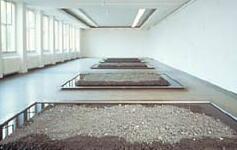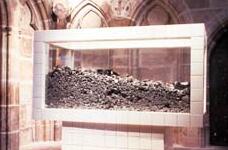 |
Urban
and Adventurous Artists
|
|
| This page: |
Part 1 of the list: |
Part 2 of the list: |
Part 3 of the list: |
|
|
|
|
|
| - |
30
January 2005 - more than 50 new items here - there are
more than 300 items in part 1, part 2 and part
3. |
| ______________
Chaos _ great and small __________ |
1995 – The German art collective p.t.t. red glued 25 cent
pieces to the plaster of Wall Street in New York. Using polaroids
and video footage they documented how (presumably rich) bankers
and brokers tried to pick up the coins – often in vain. Some
homeless people were more persistent and they used a hammer and
chisel to acquire the coins.
1996 - Maurizio Cattelan organized an actual break-in of the
private Amsterdam gallery located opposite the Appel foundation,
exhibiting in the latter te products of his theft. (Another
fucking readymade, 1996)
1996 - Wolfram Kastner and seven citizens of Salzburg took
position in the local cemetery in front of the war memorial. They
carried banners saying "we honour the deserters". This
artistic action (called "visual disturbance") had not
been authorized. The artist finds it idiotic that on all-saints
day a public remembrance service for fallen SS comrades is
allowed by the authorities. The action of the artist was
penalized by a fine of 2200 Austrian Schillings or two days in
prison. Wolfram Kastner has decided to sit two days in prison on
the same days that the SS remembrance service takes place.
| 1997 - Maurizio Cattelan, ditch, earth –
installation at Le Consortium, Dijon, France (Untitled) |
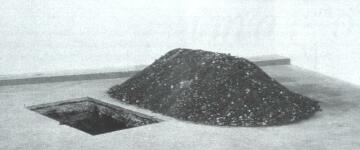 |
2002 - The police seized eleven swastika sausages
(“Hakenwurst”) on the flea market at the Boxhagener
Platz. Berlin artist M. Petersen is surprised that he has been
arrested now, because he has been selling his sausages since
2001. Vacuum packaged mortadella with an embedded swastika
symbol, “guaranteed to be inedible” and available in
two tastes: “fascist pig” and “fascist cow”.
The enclosed note says “art, handle with care”.
Petersen says he tries to come into contact with other citizens
and that he is successful. He does not see a danger that his art
could be misunderstood. He regards his swastika sausages as a
subversive strategy and not as a cheap provocation. He has
claimed damages of 1.150 euro for the confiscated artworks.
| 2003 - Jeroen Jongeleen marked several art books in
the Rotterdam library using a rubber stamp depicting a
fingerprint. |
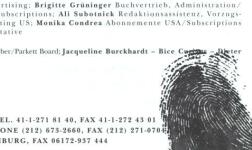 |
| 2003 - An Austrian artist has staged an anti-war
protest by parking three cars with controversial slogans
in Vienna. Poeter Siegl parked a red Ford Mustang for
George W Bush, a white Rolls Royce for Tony Blair and a
hearse for Saddam Hussein. - The cars are offered as
"head money" for anyone who "brings the
balls" of the politicians to Vienna. They bear
similar slogans, saying: "The first who brings the
balls of George W Bush / Tony Blair / Saddam Hussein wins
this car." (Car Wars) http://reflex.at/~citybiker/carwars/
http://www.poeter.at/ds41.htm
http://www.ananova.com/news/story/sm_766386.html
|
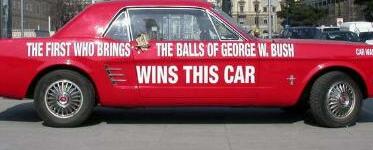 |
| 2004 - An anonymous individual has stamped 5 euro
bills with a picture of Adolf Hitler and put them in
circulation. The first - and possibly only - bill was
found in the Dutch city of Den Bosch. |
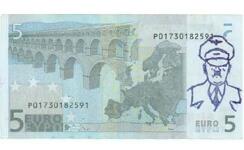 |
| _____________
Creative destruction ______________ |
| 1992 - Maurizio Cattelan combed the classified ads in
search of safes belonging to burglarized institutions or
individuals. Then he exhibited these damaged safes such
as he found them. (76400000) |
 |
| 1992 - Dutch artist Dick Raaijmakers destroyed twelve
microphones by cooking, crushing, burning etc. The goal
of the experiment was to demonstrate that a microphone
can never be a musical instrument. (V2 - Intona: dodici
manieri di far tacere un microfono) |
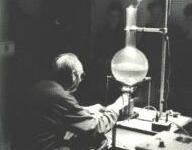 |
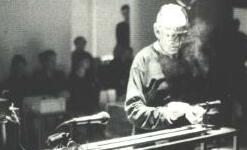 |
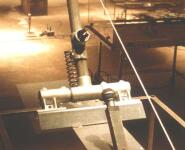 |
| 2000 ? - Dutch artist Dick Raaijmakers destroyed a
series of cuture-related objects to demonstrate that
sound and vision are only tenuously related. (V2 - Beeld
Streepje Geluid) |
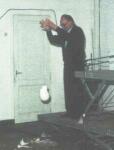 |
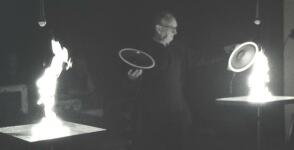 |
2002 - Berlin artist Klaus Weber is cultivating the enormously
strong mushrooms “Agaricus bitorquis”
(Trottoirchampignons). These mushrooms can make holes in asphalt
road surfaces. An open space behind the Mendelssohnstrasse was
asphalted and spores of the mushroom (that can lift six
kilograms) were seeded under the surface. Already the first
mushrooms are beginning to surface.The artist was assisted by the
Mushroom Research Group of Berlin Brandenburg. They found the
initial mushroom and collected the spores on a sheet paper. The
spores were placed in a nutritive solution, in which the white
slimy mycelium could grow. Then the mycelium could grow further
in boiled wheat grains. The infected grains were planted in
boreholes in the asphalt in September. The mature mushrooms will
be harvested and eaten.
| __________ Political
action and resistance __________ |
2003 – Wolfram Kastner distributed tickets for
Munich’s air-raid bunkers. He wanted to emphasize that
Munich has more than a million inhabitants, but that the 30
public shelters can house only 37.000 persons.
2003 - Wolfram Kastner sprayed the slogan 'Judensau' (Jewish
Pig) on the façade of the Sebaldus Cathedral in Nuremberg. The
artist protests against a figurative representation on the church
wall, which shows a sow and a Jew underneath sucking from its
tits. The monument is a 14th Century caricature of the Jewish
population. Kastner wants the church to place a sign explaining
the meaning of the sculpture and a statement by the church on its
meaning.
| _____________ Danger
and endurance _____________ |
| 1978 – Cologne artist Parzival
(Frank Poersch) realized that he rode the same
underground line several times each day. In the long run
these rides became a boring monotonous ritual. |
“One day I decided to turn this
boredom into a performance: A full work-day (eight hours)
of underground driving, on this one line. Maybe this
conscious experiencing of monotony would lead to a
feeling of "ecstatically increased
commonplaceness". I planned my action for 8 February
1978 and announced it by distributing leaflets in the
workshops. A friend and a fellow student, Thomas F.
Fischer, joined me and rode along for eight hours. |
From time to time we took a coffee break
at a kiosk or in the "McDonald's" at the
Barbarossaplatz. The toilet of the "McDonald's"
restaurant had a sober, white tiling and a cold neon
light. "That is a place in Andy Warhol style",
said Fischer. “A completely impersonal place, banal,
sad, casual and interchangeable.” |
1992 – Maurizio Cattelan: The night
before the opening I let myself down from the windows and ran
away. - The work presented was a makeshift ladder made of sheets
knotted together and hanging down the facade of the exhibition
building. (Flee the Castello de Rivara)
| 1999 - Maurizio Cattelan, attached his gallerist,
Massimo de Carlo, to the wall of his gallery using
adhesive tape. (Massimo de Carlo Gallery in Milan - A
perfect day) |
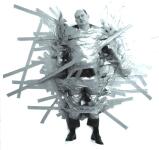 |
| 2001 – Early in the morning, the Austrian art
group “Gelatin” removed a window on the 91st
floor of the World Trade Center and slid out a tiny
balcony. For 20 minutes the artists posed on it while a
helicopter flew by and took their photographs. The action
was illegal, had been prepared in total secrecy and the
balcony was built from smuggled building materials. The
home-made balcony emerged like a 'pimple on the buildings
eelslippery face.' However, personnel of the WTC deny
that the action ever took place and states that any
documentation must have been faked. (The B thing) |
http://www.artbook.com/3883755079.html
http://www.t0.or.at/~bebe/catalog/wtc/ |
19?? - Karen Finley’s work has
included smearing her naked body with chocolate and inviting
audience members to lick it off.
| 2002 – The Austrian artist group produced
“Nellanutella” as part of their contribution
for the Venice Biennale. The artist threw themselves
repeatedly into Venice's canals from café tables,
bridges and boats. A 81 page book with their slapstick
performances is available. http://www.t0.or.at/~bebe/catalog/nutella/ |
 |
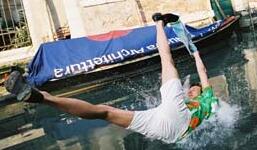 |
| ______ Infiltration
- of public and private spaces ______ |
-----
| ______________
Deserted buildings ______________ |
| 2004 - Dutch artist Florentijn Hofman made a surreal
blue artwork from several buildings that are waiting to
be demolished. (Beukelsdijk, Rotterdam) |
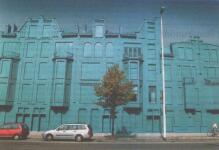 |
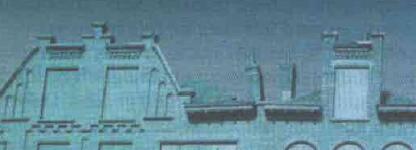 |
| ________ Explosives,
pyrotechnics and guns ________ |
| 1993 - Dutch artist Erik Hobijn built an apparatus
where a person is first covered in a fire repellant gel.
Then the person is set alight and then extinguished after
a few seconds. (V2 - Delusions of Self-immolation) |
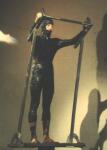 |
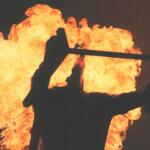 |
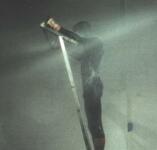 |
| 1995 - On 10 May 1933 the Nazis burnt approximately
50.000 books that were considered un-German. This took
place on the Königsplatz in Munich. Nowadays nothing
remains of this historic moment. Not the smallest sign
has been placed. On 9 November 1995 (the anniversary of
the so-called “Kristallnacht”) artist Wolfram
Kastner burnt a large hole in the lawn and placed a sign
with a text in German and English. The city was asked not
to let “grass grow over history”. In 2002 the
artist burnt a fresh hole in the lawn. http://www.wolframkastner.kulturserver.de/ |
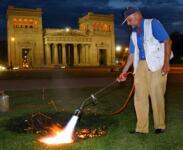 |
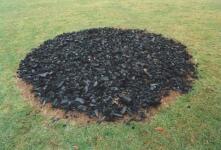 |
| _________________
High Tech _________________ |
-----
| _________________
Expeditions _________________ |
| 1971 - On high sea, midway between Ireland and
Canada, Dutch artist Ger van Elk painted a block of wood
white. It is displayed on a red velevet cushion inside a
nice case. "This is probably the most dust-free
environment on the whole planet." (La Pièce). A
documentary film is also part of the work. |
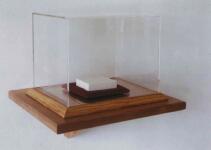 |
| 1978 – Cologne artist Parzival
(Frank Poersch) investigated the "cultural and
culinary underground" of Cologne. On Bonn Street we
found a “schnellimbiss” (snack corner), that
had changed owners several times but none of the new
tenants took the trouble to remove the old nameplates.
Thus the lunch was called "Witwe Boltes
Hähnchengrill", "Bradley's Imbiss" und
"Taverne Athena" at the same time. Above the
bar it had a large dark sauce-stain and each time we and
I visited it we speculated how violently one must have
shaken the container to produce a stain at this height.
At the Zülpicher Platz we found a grill that still had
it’s original fifties furnishings. |
We designed an alternative city-tour and
called it "Andy's travel office". The tour went
along cheap gambling halls with 20-year old pinball
machines, the taxi-driver’s grill at the
Hohenzollernbruecke, the factory ruins in the suburbs,and
finally the addresses of the local VIP’s
("Visit the homes of the starts") and the
Weidengasse with it’s mix of garbage shops, Turkish
kebab-restaurants and potato-pancake stands. |
| 2003 - An unusual person (artist Christian Hasucha
calls him "The Stranger") will visit Neuhausen
in March. His head is covered in a white cocoon with tiny
holes. His hands are encapsulated in hard white shells.
The Stranger can hear and see, but he cannot speak and
cannot communicate by signs or gestures. The stranger
knows neither the city of Neuhausen nor its inhabitants.
He comes not as a tourist, but will try to participate in
all facets of everyday life. He is anxious to be invited
by citizens of Neuhausen and to accompany them on their
daily routines. |
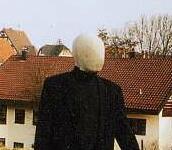 |
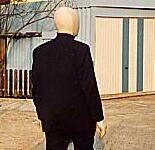 |
| __________ Urban
garbage __________ |
1960 - Arman, "Manifestation of Garbage" exhibition
at the Iris Clert gallery in Paris.
| 1961 - Manzoni began to produce his series of Fiato
d’artista and Merda d’artista (Artist’s
breath and Artist’s shit) and planned also to create
containers of Sangue d’artista (Artist’s
blood). After producing 90 cans of Merda d’artista
“contents 30 grams net weight, naturally preserved,
made in Italy” calculated their value with the daily
exchange rates for gold. The Tate Gallery recently paid
35.900 euro for one of the tins, numbered 004. It will
certainly rise in value. Of the 90 tins that were filled
in 1991 only 45 remain. The rest have exploded because of
internal fermentation – like Manzoni intended. |
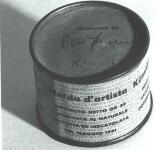 |
 |
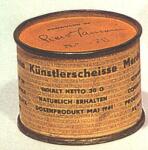 |
1993 - Shit and Art - Special Issue of the Art Journal on
scatological art, Vol. 52, No. 3, 1993
1994 - Maurizio Cattelan made two piles of sacks of demolition
rubble wrapped in a sheet of transparent plastic. Each of the two
piles is set on top of a construction pallet. The material came
from three buildings damaged by Mafia bomb attacks: the
Padiglione d’Arte Contemporanea in Milan, the Uffizi in
Florence and a church in Rome. (Lullaby)
| ___________________
Innovative graffiti, stickers etc. _________________ |
| 1992 > Cologne artists Parzival (Frank Poersch)
has been nailing wooden boards and planks over billboards
in Berlin since 1992. He was inspired by a visit to the
Brazilian “Favelas”, the infamous slum areas
with improvised wooden dwellings. After his return
Parzival began to nail wooden signs of poverty (garbage,
broken crate parts and other discarded items) over the
emblems of affluence and consumer intoxication. The
Favela inhabitants collect wood on the road out of
necessity, the European artist collects it to silence the
lies of the advertisement industry. He has been arrested
three times but each time the prosecution was dropped. In
ten years Parzival has made 110-120 nailings in Berlin,
Cologne, Leipzig, Kassel, Bonn, Frankfurt, Mainz and
Duesseldorf. “An advertising company has stated that
each billboard attracts 50,000 eye contacts. Therefore I
have attracted about 5 million glances. A beautiful
result for an artist". |
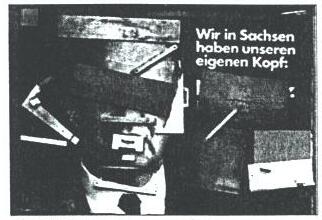 |
| 1994 - Christian Hasucha - In the morning of 9 April
1994 Matthias S. put on a belt with a container filled
with light-grey printing ink and walked out his front
door. The tube connecting the container with the
printing-stick hung down along his leg. A whole day long
he would carry the equipment with him and would mark his
movement throughout the city. Off he went … (Der 9.
April am rechten Fuß des Mathias S. ) - http://www.hasucha.de/intervention_19/dokumentation.html
|
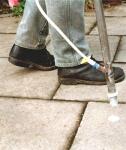 |
1995/96 - Stefan Micheel and HS Winkler
(group p.t.t. red) received a Berling art grant to stay one year
in New York. The grant money they received was exchanged for
bills and each dollar bill was stamped with the phrase : “p.t.t
red dollar – money for cultural purposes”
and subsequently put into circulation. Genuine money was enriched
artistically, but it kept its value, it did not become a work of
art, but remained viable currency, until the American Bank took
would withdraw it from circulation.
| 1999 - On 7 November 1999 (on the occasion of the
60th anniversary of the assassination attempt of George
Elser on the Nazi leadership) Wolfram Kastner sprayed a
statement by Elser from his interrogation with the
Gestapo on the plaster of Munich: “I wanted to
prevent even more bloodshed.” Subsequently he
sprayed the name “Elser” on the black memorial
stone in front of the State Chancellery. He was punished
by a fine of 500 DM and the cost of cleaning the
inscription. http://www.t0.or.at/rueckgabe/strafverf.htm
|
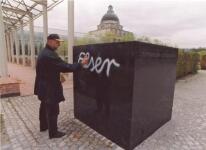 |
2000 - Heath Bunting writes: The perfect
project for me is walking down the street, looking at something,
having an idea and having it finished by the evening. Like the X
project, it's just a graffiti project. I would graffiti a URL,
and if people were interested and saw it and noted it down and
visited that site, it would ask them where they saw it, who they
thought did it and why and it would keep a log of that
information. So it's a log of my travels and of what people think
of graffiti. I think that's my favourite project, it's very, very
simple but it's going five years now. http://irational.org/climbing/rotterdam/
| __________
Installations, improvements, decorations __________ |
| 1966 - Yaoi Kusama created an installation at the 33d
Biennale using 1500 mirror balls. Her attempt to sell
them for 2 dollar each met with strong objection from the
Biennale authorities. (Narcissus garden, installation at
the Venice Bienale) http://www.yayoi-kusama.jp/
|
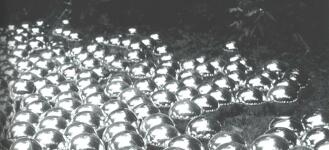 |
1993 - Christian Hasucha - Small iron platforms were
constructed for the 50 participants of “Intervention
P”. An anonymous group of actors were selected by sending
out invitation letters and reply forms. The platforms are
installed at a height of 20cm on individually selected lampposts.
Participants can use the platforms for a limited time period. (P)
| 2001 - Doug Fishbone installed a gigantic mountain of
bananas - well over a ton of them - in the historic town
square in Piotrkow Trybunalski in Poland. The work, which
was eaten by the crowd in minutes, was meant as a
commentary on greed, globalization, consumerism and
violence. The same installation has been shown in Latin
America in 1999 and 2000 and in New York in 2002. http://www.wizya.net/em/doug2001.htm
|
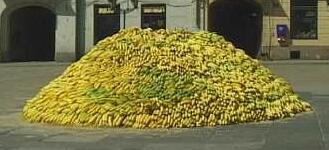 |
| 2001 > Winfried Baumann has designed shelters for
homeless people and other urban nomads. “Instant
Housings” are mobile living spaces designed for the
special situation of its users. They are space-saving,
mobile and manageable by a single person. “Instant
Housings” are mainly meant as sleeping places, but
they are also always art. http://www.winfried-baumann.de/instant_housing/index.html
|
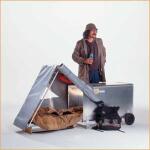 |
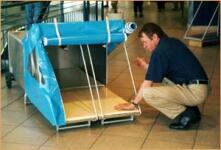 |
2002 - Berlin artist Hans Winkler transported 600 tins of
Ravioli (Italian pasta product) from a German supermarket to
Tuscany (in Italy) and he used the 600 tins to build a wall in
the library of Manciano. Winkler was inspired by the German
camping tourists who usually take along their own food for their
Italian vacation.
| 2003 - A homeless person sleeping behind
the Royal Library in The Hague has made an ornamental
garden that is planted with weeds, potatoes and tomatoes.
There have been a few more of his works - in the shape of
a circle or a heart. |
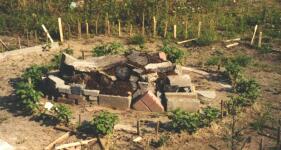 |
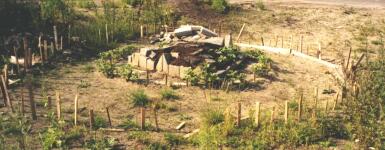 |
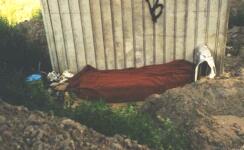 |
| __________ Poetry,
theatre and intensified perception of place __________ |
| 1956 - Manzoni drew lines of various lengths enclosed
in black cardboard boxes, each bearing a label indicating
the date and length of the lines – which range from
1.76 to 140 meters to, finally, infinity as in the Linea
di lunghezza infinita (Line of infinite length) in 1960.
During his stay at Herning, Manzoni executed a line of
7.200 meters long at a newspaper mill on the afternoon of
4 july between 4 and 6:55 p.m. The line was enclosed in a
lead cylinder made up of square plates. |
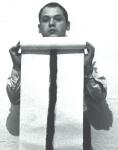 |
 |
 |
| 1993 - Christian Hasucha - 1) Ten residents of St.
Petersburg - participants in the intervention - select
surveyable areas in the residential area of their city.
2) White-painted steel stools are permanently installed
in convenient locations. 3) Sitting on the stools, the
participants note the daily events that they observe. 4)
A week later facsimiles of the notes are fastened to
fences, masts, trees and walls within view of the
described area. 5) The stools remain in place. (Public
Diary) |
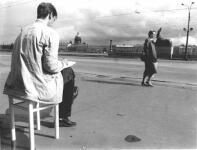 |
| 1993 - Christian Hasucha - In a snack bar in the city
of Langenhagen the iron foot of the one standing table is
embedded in the floor. The tabletop levelled into a
precise horizontal position. A black-and-white tape marks
the circumference of this round table. Professional
surveyors mark this height on all the lampposts of the
city. Even in remote areas of the city pedestrians are
confronted with this plane of reference / standard
elevation. (Ebene Tisch) http://www.hasucha.de/intervention_18/dokumentation.html
|
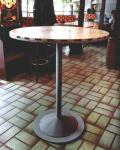 |
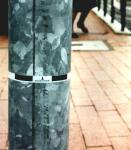 |
| 1993 - Dutch artist Henk Visch erected a surreal
bronze monument to the last gas station. "A momument
for the time when there will be no cars anymore and we
will all be walking along the highway. Then people will
wonder what this building was all about." (Monument
for a gas station, Located between Barneveld and Ede, A30
highway, East of kilometer marker nr. 18) |
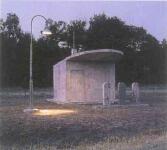 |
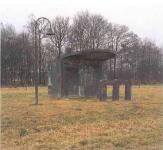 |
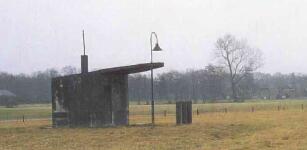 |
| 1994 - Christian Hasucha - Responding to an intensive
invitation campaign, 76 citizens of Dortmund selected a
section of their daily walk; approximately 20 steps long.
The endpoints of these sections were marked and numbered.
The names and positions of the road sections were
published on posters. (Wege) http://www.hasucha.de/intervention_20/dokumentation.html |
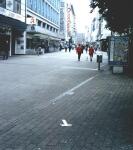 |
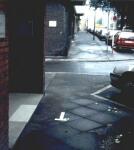 |
1995 – Chris Wilder produced a partial reprint of
“Project Blue Book”, the U.S. Air Force investigation
into sightings of UFO’s. Out of three thousand photographs
included in the project, Wilder has selected twelve. These range
from the vaguely plausible, to the obviously preposterous,
including a photograph of a shaved monkey presented to the
military as evidence of alien life.
19?? - Cologne artist Parzival (Frank Poersch) felt inspired
by an urgent need. Being severely inebriated the artist relieved
himself in a Cologne shopping street and afterwards he made a
photographic documentation called " Kölner Pissecken"
(Cologne pissing corners). For this project the artist used a
grant provided by the SPD / Green political parties (1,500 DM)
which was meant to document "Cologne favorite places".
| __________
Unclassified but urban and interesting __________ |
1969 - James Turrell and Sam Francis make a series of airborne
works with clouds and aeroplanes over Pasadena, California
1986 - Lothar Baumgarten, "Vacuum" at the Carnegie
Museum of Art
1992 - Maurizio Cattelan collected $10.000 from one hundred
people to be given to an artist who would agree to abstain from
exhibiting his/her work for one year. When the selected
recipients refused to accept the grant, Cattelan took the money
and ran to New York. (Oblomow Foundation)
1993 - Maurizio Cattelan sold his exhibition space at the
Venice Bienale to an ad agency (Lavorare e un bruto mestiere).
1993 – Aernout Mik created a “living
installation” for a space in the modern conference center La
Vie in Utrecht. While the entire building was buzzing with
activities, in classrooms and meeting rooms, in a small room on
the fifth floor a number of people lay asleep on beds in the semi
darkness. Complete silence prevailed. Only the quiet regular
breathing of those asleep could be heard.
| 1993 - In a self-portrait Douglas Gordon poses in the
middle of a deserted motorway. He is holding a sign
reading “psycho.” Don't fancy his chances of
getting a ride. |
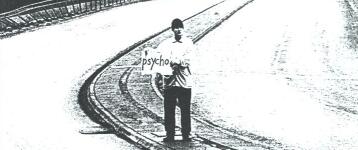 |
1995 – In room 208 of the Stedelijk Museum Aernout Mik
has arranged a group of museum guards. Some are real people,
others are dummies clothed in the guard’s uniforms. They are
“indistinct figures” and their personalities are
flattened by their uniform appearance and reticent behavior that
is prescribed by the museum rules. Due to the likeness of the
static (dummy) and living figures a strong sense of suspense
arises, and one’s view of the guards in the museum is
changed.
For further research (by me)
| 1999 - The Dutch topographic service paints black and
white reference points on roads. These are used as
callibration points for aerial photography. Jeroen
Jongeleen added a series of "illegal" markers
to their existing system, in an suggestive attempt to
create friction in their work of measuring the land. (100
meetpunten, location: Hoek van Holland, NL). |
|
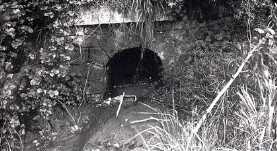
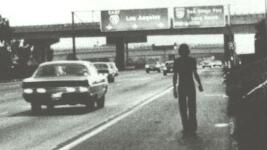
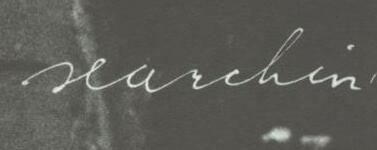
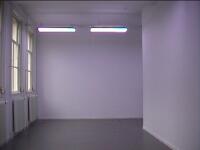
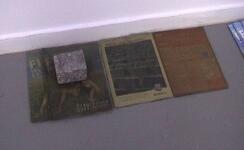

Check out this related site by Matthew Hunt: CENSORSHIP -
Obscenity, violence, and profanity in cinema, art, photography,
performance art: http://members.tripod.co.uk/mathunt/censorship.html
Copyright issues
I always try to obtain permission to
use the pictures. But sometimes the webmaster or owner of the
website are unreachable. Sometimes the webmaster doesn't know the
address of the artist or photographer. Sometimes the artist
doesn't answer my mail. Sometimes the source of the picture is
unknown. Contact me if you object to the use of your picture or
text and it will be changed or removed
promptly (or a copyright notice will be added, or a
web-link, whatever you like) - (kazil a.t euronet d.o.t nl)
Back to: Urban Adventure in Rotterdam




























